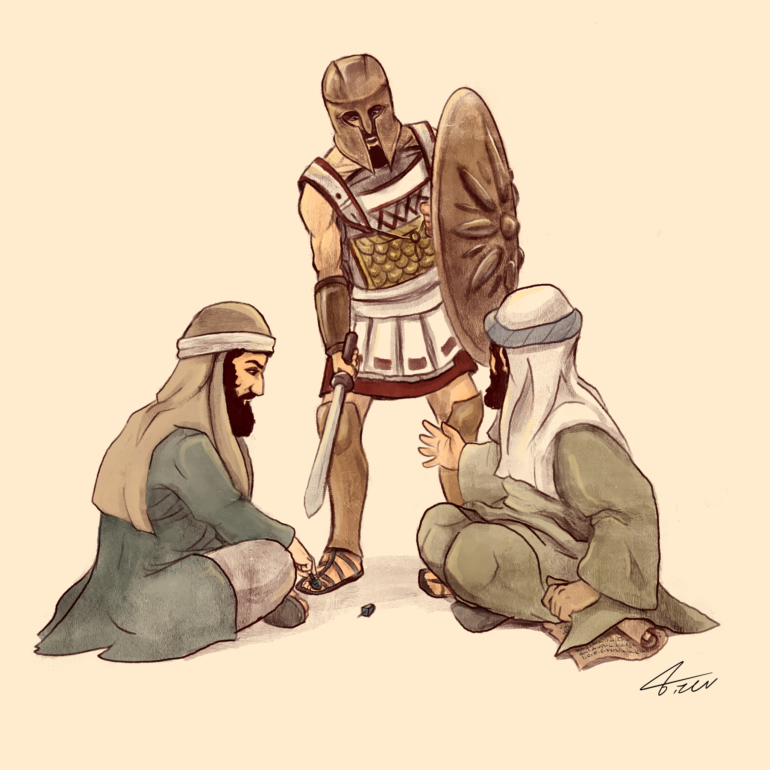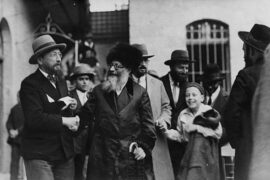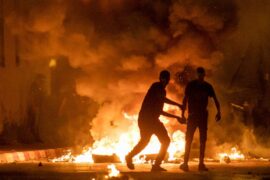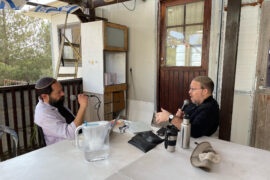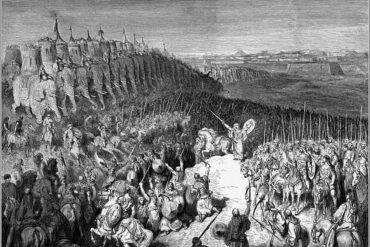The ninth chapter of a podcast series on the first Book of Maccabees.
For more content from VISION Magazine, subscribe to our newsletter and follow us on Twitter @VISION_Mag_, Facebook and YouTube. If you haven’t already, don’t forget to subscribe to our podcast on SoundCloud, iTunes, Stitcher, TuneIn, or Spotify and leave a rating and review to help us get our message out to a wider audience!
To support the podcast, head over to our PayPal portal and be sure to write a note that your contribution is for the podcast.
Hosted by: Robert Goodman
Transcript:
Shalom Aleikhem! And welcome back to Sefer Maccabim!
Last time we took a brief detour from the endless battles and learned how Yehuda HaMaccabi made an alliance with the Roman Republic. We’ll pick up from where we left off at the end of chapter 7, when Yehuda slew the general Nikanor, Jews from villages all around poured in to successfully kill all the mercenaries and a yearly ḥag was declared on the 13th of Adar.
It doesn’t take long, however, for word to reach Demetrius of his defeat, and he is not going to take it lying down. He immediately sends his general Bacchides, whom he had recalled to Antioch, back into Judea along with a gigantic army to retaliate against the Maccabim. Alcimus the Kohen Gadol meets him and joins forces, because don’t forget, even though he’s not as Hellenized as Menelaus was he still sees the Maccabees as a bunch of fanatics who represent on obstacle to a lasting peace.
This, by the way, is in the year 3629, or 131 BCE, seven years after the beginning of the revolt. The gigantic Seleucid army marches into Judea via the Galilee and massacre many Jews there. But their goal is the recapture of Jerusalem. Bacchides surrounds the city thinking to trap Yehuda inside. However, when he learns that Yehuda had already left the city with his men, he turns round and leads his forces towards him.
Yehuda sets out with his men to meet Bacchides in battle, encamping his forces at Elasa – a town north of Yerushalayim.
Now don’t forget that at this time the Ḥassidim have deserted Yehuda and he has been left with just his core group of three thousand committed followers, the Maccabim. There’s a disagreement between the first book of Maccabees and Josephus as to how many soldiers had come with Yehuda to this battle – the Book of Maccabees says all 3,000 of them came to the battle, while Josephus holds that only 1,000 men were present. But what they do agree on is that when the Jews see the gigantic Seleucid army encamped nearby, they become terrified and many of them slip away from the battlefield.
Yehuda is left with just 800 men. When he sees how many men have deserted, he is sorely distressed, because the battle is imminent, and he has no time to gather them together again. But nevertheless, he exhorts his men: “!קומו ונלחמה את אויבינו, אולי נוכל נכה בם” – “Let us arise and fight our enemies, for perhaps we shall be able to smite them!”
But his men tell him dejectedly that it’s impossible: “We haven’t got a hope, we should flee now to save ourselves, and return later with more soldiers.”
But Yehuda responds, “Let not the sun ever see such a thing, that I should show my back to the enemy? Although this be the time that will bring me to my end, and I must die in this battle, I will rather stand to it courageously, and bear whatsoever comes upon me, than by now running away bring reproach upon my former great actions, or tarnish their glory.”
Yehuda’s message is clear: “If my time has come now, I will face it, and I will not run away.”
They have no time to say anything else, for Bacchides’s soldiers have emerged from their tents and are preparing to fight. Bacchides arranges his army into a central body, and a left flank and a right flank on either side; he himself was positioned in the right flank. Bacchides commands his trumpeter to sound a blast on the trumpet, and Yehuda’s men also sound their shofarot, and the battle commences.
At the start, Yehuda sees that Bacchides and the strongest part of the army are stationed in the right flank, so he takes his hardest men and leads them in a frontal assault towards the right hind side of the enemy army. Their tactics work, and Bacchides and that part of the army brake ranks and are forced to flee quite a distance with the Jewish fighters in hot pursuit.
But when the left flank of the army see that the right flank has been broken, they hurry after them and end up surrounding the Jewish fighters, who now have the right flank of the Seleucid army attacking them from the front and the left flank attacking from behind. Not being able to flee, Yehuda and his army gather their weapons and fight the mercenaries who are closing in on them from all sides tooth and nail. They fight like demons, slaying many, many of them. But many of the Jews are slain as well, and at some point, Yehuda HaMaccabi is wounded. He goes on fighting, but eventually the battle wound saps his strength, and he falls down. And there on the battlefield near Elasa, he gives up his soul to HaKadosh Barukh Hu. Yehuda HaMaccabi is niftar.
The remnant of the eight hundred Jews, when they see their legendary commander lying still on the ground, flee. The battle of Elasa began at daybreak and ended at sunset, and the Jews have lost their leader. Shimon and Yehonatan, two of Yehuda’s remaining brothers, by way of a treaty with the Greeks are able to recover Yehuda’s body and carry it to Modiin, where they bury him with his father Matityahu ben Yoḥanan.
Bnei Yisrael mourn him many days, this legendary warrior who raised them up from slavery under the Seleucids and restored Israel to its former glory.
While Yehuda was alive, he struck fear into the hearts of all his enemies. But once word gets out that he is dead, the revolt begins to come crashing down. All the Hellenists feel encouraged and begin making trouble again. A famine strikes Judea, and many of the Torah-observant Jews who otherwise might well have stayed to fight are forced to leave the country for Greece, of all places, because the lack of bare necessities combined with the oppression the Hellenists are causing them is too much for them to bear.
Of those Jews who do stay, conditions rapidly deteriorate even further because Bacchides appoints the Hellenists to rule over Judea, and they set about hunting down the remnant of Yehuda’s followers to turn them over to Bacchides. They do catch many of the loyal Jews this way and gleefully hand them over to the general, who takes delight in killing them slowly and tortuously. Conditions haven’t been this bad since Bnei Yisrael returned from Babylon over two hundred years previously. All of Yehuda’s good work seems to have unravelled – Torah Jews are being hunted down, they are without proper leadership, the Seleucid Empire once again has the upper hand.
Seeing that if something doesn’t change the Torah will be destroyed from Israel, the few Maccabim who have yet evaded capture approach Yehonatan, Yehuda’s youngest brother, and they beseech him:
“אחרי מות יהודה אחיך אין כמוך בארץ, לצאת ולבוא לפנינו להצילנו מכף בכחידס ומכף כל דורשי רעת עמנו. לכן בחרנו בך להיות לראש ולנגיד עלינו תחת יהודה אחיך, וללחום את מלחמותינו.”
“Ever since your brother died we have had no leader, no one like him to go out and save us from our enemies. Will you be our leader in place of your brother, and fight our battles, and save us from this calamity that has befallen us?”
The people are asking Yehonatan to be their leader in Yehuda’s place.
When Yehonatan affirms that just like Yehuda, he is ready to lead them and die for them if necessary, the remaining Maccabim appoint him as general of the Jewish army.
Of course, word reaches Bacchides that Yehuda’s death has not ended the revolt, that there are still a handful of Jewish fighters who have not accepted defeat, and he immediately sets out to kill Yehonatan and crush the last spark of Jewish rebellion. But word of this reaches Yehonatan, and he, his two brothers and their handful of remaining followers grab their possessions and flee east into the Judean desert, and camp by the shore of the Dead Sea. When Bacchides hears about this, he mobilizes his army and approaches the Jordan River, ready to annihilate Yehonatan and his men.
Yehonatan knows that a battle with Bacchides is inevitable, but before that they have another pressing problem. They brought lots of their possessions with them when they fled into the desert, and during the battle they won’t be able to look after these possessions. So Yehonatan sends his oldest brother Yoḥanan and a few companions, off into the desert with all their possessions to speak with the Nabateans.
You might remember the Nabateans from chapter 5 – they were a Semitic people living in the desert east of Judea around this time, and they were on good terms with the Jews. Yehonatan had ordered his messengers to request of the Nabateans if they could deposit all their possessions with them until the confrontation with Bacchides was over.
It’s quite likely the Nabateans would have complied, but unfortunately Yoḥanan never manages to meet with them. In the middle of their journey Yoḥanan and his companions, laden with the Maccabi possessions, are spotted by a group of bandits, the children of Yambri, who ambush them by a city called Medaba, steal everything they have and kill Yoḥanan and his companions.
News of their brother’s death reaches Yehonatan and Shimon, who are distraught. But the chance to avenge their brother will not be long in coming, as we shall see.
Meanwhile, Bacchides has located the Maccabean camp, and he deliberately chooses to battle them on Shabbat, thinking perhaps that the Jews will refuse to fight and he will be able to massacre them easily. Of course Yehonatan has seen this trick before, and has no qualms about fighting on Shabbat to save his people. But the situation does not look good: The Seleucids manage to corner the Jews, who are surrounded with the Jordan River at their backs and the Seleucid army at their front and sides. So Yonatan turns to his men and exhorts them: “We are surrounded, and the enemy comes to destroy us. Now let us pray to our God to grant us success, and then let us fight them with all we have, because our lives are at stake.”
Upon this Yehonatan and the Maccabim surge forward to meet the oncoming Seleucids, and HaShem grants them a miraculous victory, allowing the handful of cornered Jews to slay around a thousand men. At one point, Bacchides approaches Yehonatan, who stretches out his hand to kill the other general. But Bacchides anticipates this and dodges the blow. Clearly, Yehonatan is proving himself more than capable of filling the leadership vacuum left by Yehuda.
Once they are satisfied they have struck the enemy a sufficient blow to deter them from further fighting, Yehonatan, Shimon and their men leap into the Jordan, swim its breadth and escape into the wilderness to the east. The Seleucids do not follow; rather Bacchides returns to Jerusalem and begins repairing and strengthening the fortifications in many of the major Judean towns, like Beit Tzur, Gazera and most of all the Acra in Jerusalem, and stocking them with supplies and mercenaries, to ensure they can cause as much aggravation to the Jews as possible.
He also kidnaps the sons of some of the most important Jews in Jerusalem and shuts them up in the Acra as hostages, to ensure that the Jews won’t fight back. Yehonatan and the Maccabim will come to rescue them, but right now they are far away in the desert and dealing with a pressing family matter.
Someone informs Yehonatan and Shimon that the children of Yambri, the bandits who slew their brother, are making an illustrious marriage: one of their young men is marrying the daughter of a very important man from the city of Medaba. They immediately have the same idea: this will be the perfect opportunity to avenge their brother. So they and their companions journey to Medaba, where the marriage will take place, and hide themselves in the nearby mountains to watch. Soon they see the bride and bridegroom coming forth amid a huge company of friends carrying drums and musical instruments. Then Yehonatan and the Maccabim reveal themselves, emerge from the mountains and begin to slaughter everyone in the wedding party. They succeed in killing around four hundred, the remainder flee. The Maccabim then take all the spoils, of which there are many. As the text says, “Thus the marriage was turned into mourning” and they have fully avenged their brother.
Does this seem excessive? I don’t know. First of all, it does seem midda keneged midda – measure for measure; the Yambri took lives and plundered possessions, so the Maccabim responded with more of the same. Secondly, Yehonatan and Shimon had their brother’s honor to avenge, and they had to send a message to the Yambri: “Know who you’re dealing with. If you kill our brother, we will kill all of you without hesitation.”
Anyway, now they have avenged their brother, Yehonatan and Shimon return to Judea, and to their surprise they find it rather peaceful. Once he finished building up the many garrisons across Judea, Bacchides decided his mercenaries would adequately control the region and that his presence wasn’t necessary, so he returned to Demetrius in Antioch. Judea was therefore allowed two years of respite.
However, after this time the Hellenists notice that the Maccabim have returned to Judea and are living quietly, and they eagerly send a message to Demetrius, saying, “Send Bacchides to us! Yehonatan and his men have let their guard down, if we act now we can swoop down and kill them all in one night!”
Demetrius complies, sending Bacchides back to Judea with a great army, and the latter writes letters to all the Hellenists ordering them to bring Yehonatan to him. The Hellenists set out to trick Yehonatan into accompanying them so they can lead him to Bacchides, but they are unable to because Yehonatan has caught wind of the plot and very carefully guards himself against falling into any of their traps. Enraged, and convinced the Hellenists are wasting his time, Bacchides kills fifty of their leaders.
Yehonatan is still very weary of Bacchides, however, and leads his men away to a decayed village named Beit Bashan in the desert, which they proceed to build up and turn into a fortress to use as a defense against Bacchides. As soon as Bacchides hears about this, he immediately leads his army there and lays siege to the place. The siege lasts for many days, but Yehonatan remains courageous and does not give up.
Now by this point the Torah Jews know the revolt did not die with Yehuda and that Yehonatan is commanding it, and many of them are now loyal to him. So Yehonatan comes up with a clever tactic: He leaves his brother Shimon inside the city to continue the fight against Bacchides and sneaks out himself to gather those Jews loyal to him. He gathers a great many of them, and together they sneak back to Beit Bashan, where Bacchides is still besieging the city, unaware that a newly formed Jewish regiment is approaching from behind.
By the time Bacchides does become aware of the Jews approaching from his rear, it’s too late. At night time, Yehonatan and his men fall upon the Seleucid army surrounding the city and slaughter a great many of them. Inside the city, Shimon realizes what has happened and that this must be Yehonatan returned who is killing the Seleucids, so he leads his men out of the city, burns the war engines the Seleucids were using to besiege it, and kills even more of them. When Bacchides sees himself surrounded by enemies, in front and behind, he is completely dismayed and confused as to the sudden collapse of his siege, but he decides the Jewish Hellenists who misled him about Yehonatan must be to blame, so he kills even more of them. If possible, he resolves to return in the future and finish the siege, but he’s tired and frustrated and really has just had enough of dealing with these Jews.
When Yehonatan gets wind of this, he pounces on the opportunity and sends ambassadors to Bacchides with the following message: You release the Jewish prisoners from the Acra, and leave Judea, and we’ll release the Seleucid captives we took, and there shall be no more war between us. Bacchides thinks this is a pretty decent way to wrap things up, and he readily agrees to Yehonatan’s terms. So Bacchides leads his men out of Judea, and this is the end of his role in the Maccabean revolt, for after this he never enters Judea again.
The last verse in the chapter describes the end to this phase of the conflict with the words “ותשבות המלחמה בישראל” – “And the sword ceased from Israel.” Yehonatan takes advantage of this peace and goes to live in a city named Mikhmas, a town north-east of Jerusalem where his namesake, Yehonatan ben Shaul, once surprised a great Philistine army and achieved a great victory there for his people. There, our Yehonatan begins to govern the people during peacetime, and punishes the Hellenists throughout the country, thereby purging Judea of Hellenism.
So that brings us to the end of chapter 9, in which the Maccabean Revolt, which was in danger of crashing into oblivion following Yehuda’s death, was brought back from the brink by Yehonatan. We’ll resume next time with chapter 10, in which a new player will come to contend with Demetrius.

